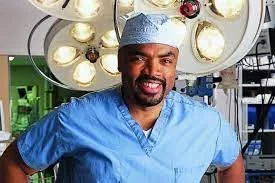Dr. Henri Ford’s Incredible Journey to Become Dean of the Miller School of Medicine
New Haitian-American Dean of Medical School calls it “His Dream Job”
Henri Ronald Ford, a Haitian-born pediatric surgeon who in 1972 at the age of 13 fled with his family from the government of Papa Doc Duvalier, settling among the Haitian community in Brooklyn, New York, and going on to earn a bachelor’s degree from Princeton and an M.D. from Harvard Medical School — is poised to begin the latest chapter in a life that embodies the American Dream.
On June 1, he joins the University of Miami’s Miller School of Medicine as its new dean. Ford, the son of a preacher, calls it his “dream job.”
“As I reflect on my journey in American medicine, I feel that I’ve been preparing all my life to assume what is an incredibly important role for such a time as this,” said Ford, who is also professor and vice chair for clinical affairs in the Department of Surgery at the University of Southern California’s Keck School of Medicine. “As a physician-scientist, physician-educator, and administrator, I feel that I must establish a culture of excellence in scientific research and promote the translation of discoveries into interventions that will transform lives, build healthier communities, and improve global health.”
Ford had been considered for deanships at other medical schools in the past, but had always turned them down, hoping that the UM job would one day open up.
“The principles that my father and mother had inculcated in our minds pretty much were applicable whether in Haiti or in the United States”
“I’ve always said that the only reason I would consider leaving my current position is to become dean of the Miller School of Medicine,” said Ford, explaining that University of Miami President Julio Frenk’s vision of making UM the hemispheric, excellent, relevant, and exemplary university is why the Miller School job appealed to him.
“The Miller School of Medicine has a unique opportunity to leverage the strength of UHealth, its hospitals, and other schools and colleges, as well as its outstanding centers and institutes to achieve this goal.
“We had to work hard and do our best.”
UHealth and the Miller School, he said, must become “the preferred destination for people seeking the latest advances in healthcare and biomedical research, especially since we are the gateway to Latin America and the Caribbean. We must become an incubator and a major hub for both clinical and biomedical innovation and partner with our executive vice president and CEO of UHealth, Dr. Edward Abraham, and our provost, Jeffrey Duerk, to help UHealth and the Miller School of Medicine achieve their fullest potential.”
“The principles that my father and mother had inculcated in our minds pretty much were applicable whether in Haiti or in the United States,” said Ford, the sixth oldest of nine children. “We had to work hard and do our best. There was no satisfactory substitute for excellence. So I had to quickly learn English so I could adapt.” And adapt he did.
Miller has a long history of providing care in Haiti
He is looking forward to becoming dean of a medical school that has a long history of providing care in Haiti. In conjunction with Project Medishare, the Miller School and the School of Nursing and Health Studies have brought critical and primary care, medical equipment, and training to Haiti.
“I’m very excited about the tremendous opportunity to potentially help Haiti establish a much-needed trauma and critical-care infrastructure so that Haitians don’t have to jump on an airplane to come to the U or Jackson Memorial for treatment or simply die in country whenever they sustain significant multisystem trauma, a heart attack, or a critical burn,” he said. “And the same also applies to other impoverished Caribbean and Latin American nations that may potentially benefit from the expertise that is readily available at the Hemispheric University.”





